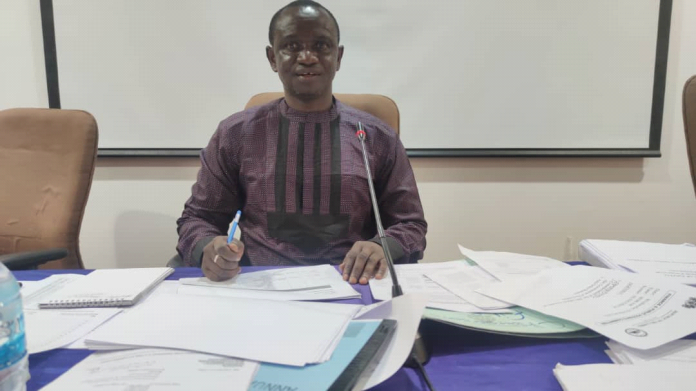By: Kebba AF Touray
The Finance and Public Accounts Committee of the National Assembly dubbed FPAC has reported that a total of ninety-nine million two hundred and eight thousand Dalasi (D99,208,000.00) was treated as a revaluation in the financial statements of the Gambia Bureau of Statistics (GBoS).
The FPAC Chairperson, Hon. Alhagie S Darboe made this revelation on Monday, 11 September at the National Assembly, while tabling the committee’s report on 2019 accounts of the government, COVID-19 phase two reports, financial statements of agencies, institutions, municipalities, and area Council.
He said, “A non-recognition of land and buildings in the 2017 and 2018 financial statements was noted and the valued land and buildings in 2019 at D19,915,000.00 and D99,208,000.00 respectively were treated as revaluation in the financial statements.”
He reported that the Gambia Bureau of Statistics (GBoS) had presented its annual activity reports and audited financial statements for the years ended from 31st December 2017 to 31st December 2019, but the GPPA has not been reviewing GBoS since 2016.
According to FPAC’s Chair, the committee has noted key findings and observations during the interface with the Board and Management of GBoS, including but not limited to payment vouchers amounting to D464,227.00, which were not presented for audit inspection and some were not numbered.
He also reported that the procurements of goods and services amounting to D450,890.00 were done without the three required invoices from different suppliers, adding that the bureau did not provide agreements entered into between them and the hospitals for treatment of their permanent staff for the years 2017, 2018 and 2019.
The committee also stated that the overpayment of salaries amounting to D15,260.69 to staff, and the payroll system did not include the history of some staff, noting that the assets recognized in the financial statement for the years ended 2017, 2018 and 2019 were not confirmed.
FPAC said: “It is noted that the Bureau did not recognise or disclose some of its assets in the financial statements even though they are deriving benefits from their use”.
He averred that they have noted that loan recoveries of D756,387.75 from staff for the period July to December 2019 were not banked to the revolving loan account on time, and reported that the Bureau issued un-authorized personal loans of D210,000.00 with an interest rate of 3% which is in contrast with the Service Rule.
After the consideration of the reports of GBoS, the committee recommended: “Management should immediately provide the payment vouchers for audit inspection and ensure that every payment voucher raised is filled and numbered accordingly; all procurements should be done in accordance with GPPA Act, rules and regulations. Failure to do so will result in the concerned officer being reprimanded; all contract documents should be immediately submitted by the management for audit inspection; all the newly appointed staff should be paid the actual number of days worked and not the whole month. The payroll software should be investigated to ensure that the historical data of all staff is stored.”
FPAC further advises: “Management should ensure that the fixed asset register shows the location, description, or type and conditions of assets to verify the assets; management should ensure that all assets are recognised, disclosed, or disposed of in the financial statements for fair presentation; management should ensure that the non-recognition of land and building are disclosed in the notes to the financial statements. And that the bureau should state this as valuation in the financial statements instead of revaluation and provide supporting documents relating to the support provided by the Ministry of Lands; management should make sure that loan recoveries are banked to the revolving loan account monthly.
“The Bureau should apply the interest rate as per the Service Rule. k. Management should ensure that future monthly reconciliations are performed in order to detect and correct errors or omissions on time; management should ensure that individual ledgers are maintained for each creditor; management should ensure that there are accounting policies for expenditure and deferred income in the financial statement; management should ensure that adequate disclosures are provided for the account balance; management should ensure that the Accounts Unit is adequately staffed to minimize the risk of errors or omission and fraud; management should liaise with the service providers to remedy the situation or look for other systems; management should ensure that formally documented and approved user management standards and procedures are in place for monitoring, controlling, and supervising the system. Each user should be given a unique username and password which must never be shared, and management should ensure that periodic reconciliation is performed between the financial and payroll systems to avoid misuse of funds or errors.”




















